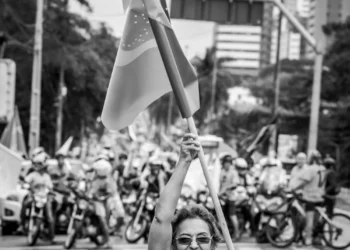by Matheus Lucas Hebling, BRaS-Blog editor-in-chief
The concern with national security and the defense of the welfare of citizens by the State is not recent. This security provided by the State cannot be absolute, since if it existed, other States would be in absolute insecurity. This restlessness, present since the formation of the nation-state, continued during the years of the cold war and in the 1990s started to move to a regional scope. Security, which was not fundamental to politics during the 1990s, becomes prominent at the beginning of the 21st century, with the 9/11 attack in the United States. How can – and how did – Brazil handle security threats internally?
The term “terror” was coined by the French Academy to describe one of the periods of the French Revolution, characterized by the accentuated means of repression applied to the enemies of the regime established by the Jacobin party, in which thousands of people were guillotined. The contemporary use of the concept of terror or terrorism has some central features, such as the use of force for political ends, as well as the psychological effects and anticipated reactions to threats.
Why terrorism? It is difficult to extract this topic from a generalized increase in the levels of acceptance of violence and non-institutional action in Western societies, both in images and in reality. There has been a process of barbarization since the First World War that has significantly contributed to the legitimacy of the monopoly of violence and coercion by the State. However, since the 1960s, it is signaled that the States have lost this monopoly, explaining, therefore, the increase in violence in the contemporary era, which is distinctive for having become an arbitrary act, a result of the growing anomie in urban centers, as well as the drug culture and the possession of weapons, what the author calls the pathological degeneration of violence, justified by the belief that all means to achieve victory are valid. Because of this, social controls that were against violent practices have become weakened.
What matters in a terrorist act is the perception of the threat itself, functioning as reminders of the vulnerability of individuals, which is massed by media coverage, with current terrorism having a global audience, which made with the objective of the terrorist action to stop being the political leader and become an act of publicizing a cause. Not only the massification made by the media but the speed and extension that technology services have today contribute to having much greater access than before.
Given this panorama, how can the State deal with this? In practical terms, the two possible actions that the State may take in the face of such a problem, of punishing or constraining. While the first aims at the cause, the second can be substantiated in the signature of international treaties and the production of domestic legislation, either due to the need to adapt it to the commitment that Brazil assumed before international organizations and/or with other nations, either on its initiative, not linked to them.
There is a domestic influence on foreign policy, which the Legislative Power must oversee and participate in the decision-making process. Contrary to the unitary model of a realist State, other actors can interfere in the decision-making processes of a country’s foreign and international policies, characterized by the existence of several decision-making centers (or polyarchic), in a divided government with information asymmetry.
The organization of the State is, therefore, directly linked to the results obtained in decision-making processes. Of the five types of power that may influence institutional variability, one has a fundamental character during the research: the agenda-setting, which directly impacts the speed of domestic negotiation of international agreements, through different interest groups, due to the circumstantial nature of proposals, among others.
There are several powers of the Legislative Power on Foreign Policy, considering the Constitution of 1988. The Legislative is responsible for the effective control and inspection over the work of the Executive, having power over international treaties signed by the Executive Branch at the international level. The Legislative Power does not participate in the negotiation nor the conclusion of international agreements.
Treaties that are signed at the international level are always signed with the condition that they will be ratified within the signatory country, and the signature alone does not constitute a binding term for the country, and internal consent is mandatory for this to have a definitive agreement and produce domestic legislation. In Brazil, the President of the Executive Power can sign international agreements but must always forward them to the Legislative for approval. Therefore, it is up to the Executive to negotiate and sign the treaty and the Congress to ratify it. The Legislative Power may also withdraw the approval.
Although the Legislative Power can change international treaties domestically by accepting, rejecting, or even making amendments on certain parts of the treaties, some believe that they are uninterested actors in this process. There are several reasons for this: by the small number of votes that international topics would generate in an electoral period, the excellence of the Ministry of Foreign Affairs (MRE) in dealing with such matters by the complexity of international issues that would create a need for high specialization on the part of congressmen or even by the characteristic of the ex-post debate of the legislature, which allows only the approval or rejection of treaties. We disagree with this, as it is a constitutional prerogative that the Legislative Power does not simply ignore international agreements just because they may be too complicated or too difficult to garner votes. What we see is actually a pattern in the decision-making process and a high level of success of bills.
The decision-making process begins when the Executive power, via message, forwards the text of the agreement to Congress, which must approve or reject it. After the arrival of the latter, it is submitted to the Committees relevant to the subject of the treaty, a rapporteur being appointed, after which the opinion is voted on in each of the committees. The text is then forwarded to the Plenary of the Chamber of Deputies and, if approved, is forwarded to the Federal Senate, where it follows the same procedure. If approved in the Senate, the Legislative Decree is written approving the text of the agreement, which authorizes its ratification by the Executive Branch. During this process, the CRE (Commission for Foreign Affairs) and the CREDEN (Chamber of Foreign Affairs and National Defense) must be consulted for the approval of the treaties.
Brazil is a signatory to all fourteen existing conventions on terrorism. The treaty appears, in this context, as a specific mechanism that can strengthen the link between the national rule of law and international behavior is the absorption of the latter in domestic law itself, is a procedure of compliance by a government concerning what had been decided at the international level.
Of the fourteen negotiated conventions, twelve passed through the knowledge of the Legislative. The processing time for international treaties signed by the Executive concerning terrorist acts is usually long. The Legislative Power does not seem to be a proactive actor in terrorism issues. As proactive, we understand the use of its constitutional prerogatives, such as reservations, urgent requests, requests for a view, requests, reservations, roll-call votes, contrary votes, separate pronouncements, abstentions, votes of rejoicing, praise, or censure. Quantitatively, the data showed us that in only 4 of the 14 conventions that passed through the knowledge of the Legislative, we observe only one of the indicators.
This venial disinterest can undoubtedly be explained by the reason that other policies may have had a preference concerning the agreements on terrorism, since the agenda-setting of a given administration as a whole, of a party or even a congressperson, directly influences how (and in what order) policies will be considered. The low occurrence of terrorist attacks in the region where Brazil is located can therefore directly influence the perception of danger and the need to accelerate counter-terrorist policies.
Hebling, Matheus. 2021. "Legislative Power and counterterrorism in Brazil". Brazilian Research and Studies Blog. ISSN 2701-4924. Vol. 2 Num. 2. Available at: https://www.bras-center.com/legislative-power-and-counterterrorism-in-brazil/, accessed on: April 13, 2025.








